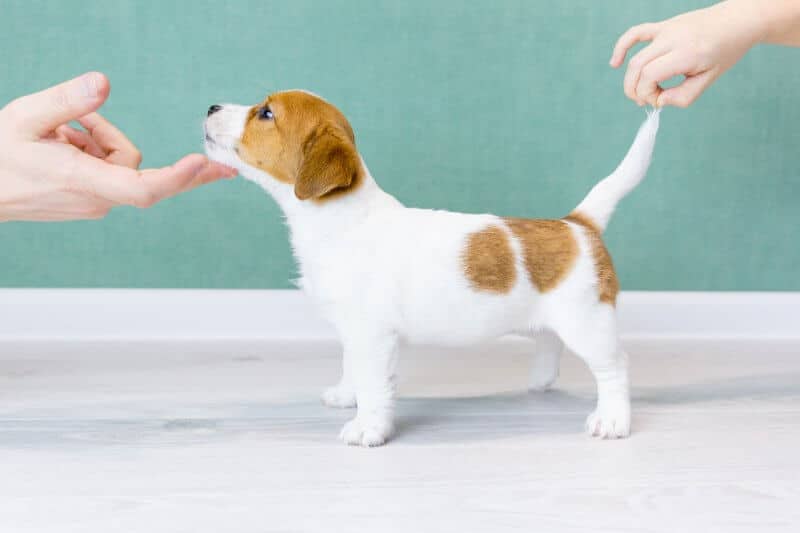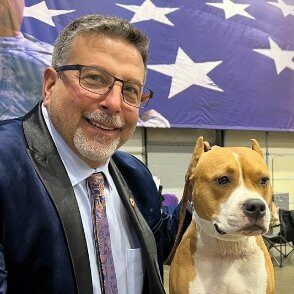
Home » Endowment Effect – Do Our Eyes Deceive Us?

In discussing psychological principles that are applicable to the world of conformation dog shows, I have analyzed how our minds affect our ability to thrive in this world. In my over forty years of running in left-hand circles, I have witnessed many individuals showing their dogs, losing in most efforts while proclaiming the merit of their dog in comparison to the competition, and crucifying the judge for her incompetence and lack of knowledge in their breed.
What amazes me is the frequency with which I hear these laments and the owners’ absolute belief that they are right about their dogs and that the judges are clueless. For the sake of the reader, I need to clarify that I know many judges who are wonderful dog people, have great knowledge of the breed standards, and try to make the best decisions possible in the ring.
However, as I wrote in my article, “Psychology of Dog Show Judging,” judging dog shows is a subjective enterprise that is exceptionally difficult due to a number of known psychological factors, preferences, and unintentional biases.
One of the things I enjoy most about dog shows is “people watching.” At times, it is as entertaining as anything happening in the ring. Last year, I was at a local show with one of my dogs; there were only three class dogs entered both days. My competition, who owned the other two dogs, were exhibitors whom I had never met before. As we entered the ring, I wished them good luck. (I think one of them snarled back at me.)
I am said to have a happy and affable demeanor when I am showing, and this extends to my competition. On the first day, I won the breed. I walked out of the ring but stuck around to watch the next few breeds, since I had friends who were showing. To my dismay, I heard my competition tearing into the judge for not putting up their dogs over mine. Truthfully, I was mortified.
I lose at times just like everyone else and I would never do this to a judge! So, the next day, I was prepared for whatever was going to happen. I didn’t wish them good luck. I was all business and won the breed again. Anyone care to guess what happened? It was like the movie Groundhog Day, where every day is a repetition of the previous day. My competition lambasted yet another judge for her decision and walked away mumbling obscenities under their breath, directed at me and the judge.
If you want to know why some people are lousy losers, consult my SHOWSIGHT article, “The Psychology of Dog Show Competition.” If I put my best objective “dog person” glasses on, I can tell you that my competition’s dogs were not good examples of the breed. So, why is it that they could not be objective about their own dogs? Is it that they do not understand the breed standard or do not know structure?
I must share with you that there is a underlying psychological factor that can overshadow objectivity when the object is something that you own; it is called the “Endowment Effect.”
The “endowment effect” has been widely studied and proven to be a very real behavioral anomaly that is, too some degree, part of all our psychological make-up. The problem with the “endowment effect” is that it stands in the way of our capacity for objectivity. One of the best-known studies of “endowment effect” took place at Duke University, a fine institution of higher learning and one of the most dominant perennial forces in college basketball.
At Duke, there is a student lottery for game tickets in the NCAA Tournament. Researchers polled a large number of students, identifying individuals who had won the lottery and individuals who had lost. Keep in mind, both groups put in the same amount of effort. It’s just that the winners were lucky enough to win.
They asked the group that did not win tickets how much they were willing to pay for a ticket and the chance to see Duke in the NCAA championships. The average amount was $170.00 per ticket. The group that happened to be fortunate enough to win a ticket was poled asking how much they would be willing to sell their ticket. The answer given was fourteen times the price that their peers were willing to pay for the exact same experience, $2,400.00. Clearly, the perceived value JUMPED the second that they became someone’s property.
We can easily imply value to tickets for championship games; however, what studies have proven is that the “endowment effect” can make people behave irrationally. Another study had two groups of college students fill out a questionnaire. One group was promised an expensive pen, and the second group was offered a bar of Swiss chocolate. During the time they were working on their questionnaires, the researchers repeatedly showed the students the reward they would receive.
At the end of the session, the two groups were merged and they were offered to exchange their reward with a member of the other group. What was astonishing is that only ten percent of the students were willing to trade, proving once again that when something is owned by an individual its perceived value rises exponentially.
For most of us, our dogs represent far more than a random possession.
Running back to the world of left-handed circles, there is an additional factor that stands in the way of objectivity; our relationship with our dog. Dog ownership offers the opportunity for far more psychological entanglement than a ticket or a pen. For most of us, our dogs represent far more than a random possession.
They are our best friends and companions and purveyors of unconditional love. This is true for the loving pet owners who buy their dogs toys and treats and better food than they might eat. In the dog show world, however, those of us who show dogs take this to a completely different level. I have offered the theory that since we often use our dogs as “objects,” they become related to our own self-worth; therefore, a loss is taken as a personal affront that can even extend well beyond the effects of the “endowment effect.”
I grew up in a show home with Standard Poodles. The den in our 1,700 square foot house was a dedicated grooming area and kennel. The backyard was a large ex-pen. My parent’s bedroom had two whelping boxes as permanent fixtures and there were Poodles everywhere. While this all denotes an unusual level of intimacy, it also required the financial commitment to show dogs successfully. Many of us spend a sizable percentage of our income on entry fees, handlers, travel, and grooming supplies, not to mention things like my 35-foot “toy-hauler” and my diesel pick-up. From a cognitive perspective, intimacy combined with financial investment will amplify “loss-aversion,” the intrinsic trait that makes all of us hate losing possessions, or in this case, competitions.
Having learned more about the challenges of objectivity in the competitive world of conformation dog shows, there are two possible responses: denial (I am not affected by these factors) or some degree of acceptance that the pain of losing has much to do with our relationship to our dogs. Personally, I find it easy to discuss these variables because I can acknowledge that there is truth to the concepts that I have discussed. I know that I am objective, and I can tell you what I like and don’t like about any of my dogs—but it still doesn’t feel great to lose.
My purpose in writing about psychology as it relates to dog shows is to provide some additional knowledge that may enhance your experiences at shows, in and out of the ring, as well as how you view the world from your perspective as an exhibitor. It is ironic that we expect judges to be objective when we, as exhibitors, often fail at the same level.
As I have stated repeatedly, judging dogs is a highly subjective enterprise that can be influenced by any number of variables. If you are not having the success that you believe you should be having, seek out the opinion of someone who is respected in your breed. And if you are an owner handler, find a mentor who can review your handling and show you how to improve. One such program that can be found on Facebook is Lee Whittier’s Dog Show Mentor program which has guided many owner handlers to success in the ring.
You can find access to my previous articles on my dedicated Facebook page. Feel free to reach out to discuss any of the topics that I have presented. Most importantly, have fun and get out there and win.
